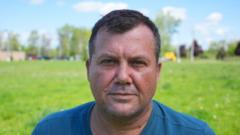In an in-depth interview, 46-year-old Charl Kleinhaus explains the motivations behind his migration from South Africa to the United States, shedding light on the complexities of refugee status for Afrikaners.
Afrikaner Refugee Shares Story of Escape from South Africa

Afrikaner Refugee Shares Story of Escape from South Africa
Charl Kleinhaus defends his new life in the US amid controversial claims of persecution against Afrikaners.
Last week, 46-year-old Charl Kleinhaus found himself in an entirely new environment—now residing in a budget hotel in Buffalo, New York, after leaving his family farm in South Africa's Mpumalanga province, known for its natural wonders. He claims he made this drastic move due to ongoing discrimination and threats against him, particularly from his community. Under President Donald Trump's administration, Kleinhaus and a group of others received expedited refugee status as they faced what they assert is a growing crisis for white farmers in South Africa, an assertion the South African government has repeatedly denied.
Reflecting on his life before the United States, Kleinhaus lived in a five-bedroom home surrounded by family and animals, yet now finds himself in a stark reality while looking for safety. He described the change, stating, "I didn't come here for fun," emphasizing the seriousness of his situation after having received death threats through social media. He mentioned leaving behind his car and even his mother as part of his escape.
His arrival into the United States was marked by a celebratory atmosphere at Dulles Airport, with red, white, and blue decorations. Despite this new hope, criticism surrounds the refugee status granted to Afrikaners at a time when many other groups, such as Afghans, face removal of their protections. President Cyril Ramaphosa of South Africa labeled this group as "cowards" for fleeing rather than confronting historical injustices.
Kleinhaus acknowledges the complexities of land ownership and the legacy of apartheid in South Africa, admitting that while black citizens face substantial hardships, he, too, is grappling with threats and challenges related to land expropriation laws that put his family’s farm at risk.
Despite facing skepticism, Kleinhaus refrains from labeling his experience as purely victimization, acknowledging crime does impact many in South Africa. He clarified his view that he wishes to avoid being a victim at all costs and described receiving threats indicating his imminent danger.
General societal responses to his migration demonstrate a stark divide, starkly reflected in ongoing debates about historical injustices and the legitimacy of claims from white farmers. As the US government employs stricter vetting processes for those seeking asylum, Kleinhaus expresses both gratitude and nervousness about the political motives tied to his group’s refugee status. He remains hopeful, influenced by his faith, trusting that his presence in the US is part of a larger plan. Seeking acceptance, he aims to contribute positively to his new home despite facing scrutiny over past social media posts labeled as antisemitic.
While the politics surrounding his resettlement are complex, Kleinhaus insists that his journey is not one for opportunism but a quest for safety and the future of his children.




















